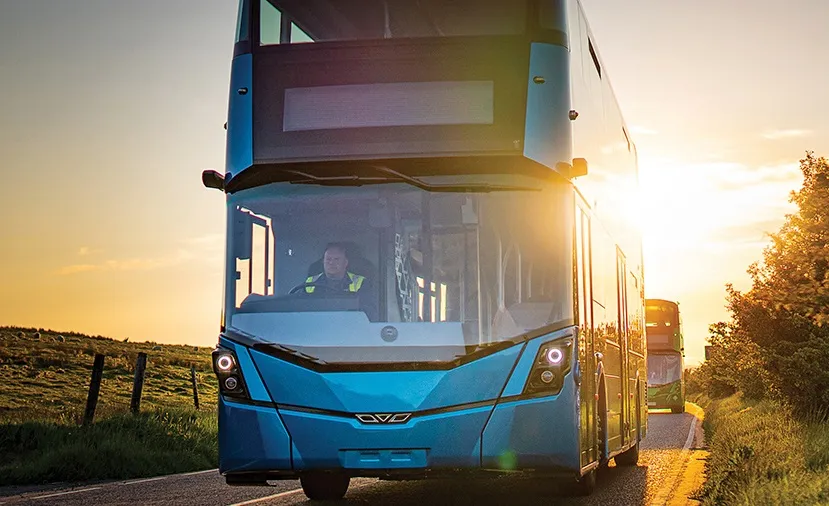Britain cannot meet its future transport needs without HS2, according to new evidence published by the government. Even with over US$80 billion of planned transport investment over the next six years the country’s railways will be overwhelmed. The strategic case for HS2 sets out in detail the need for a new railway line to provide the vitally needed extra capacity.
Central to the case is new data that reveals the true extent of the crisis facing the UK rail network and the impact alternatives to buildin
October 30, 2013
Read time: 3 mins
Britain cannot meet its future transport needs without 1995 HS2, according to new evidence published by the government. Even with over US$80 billion of planned transport investment over the next six years the country’s railways will be overwhelmed. The strategic case for HS2 sets out in detail the need for a new railway line to provide the vitally needed extra capacity.
Central to the case is new data that reveals the true extent of the crisis facing the UK rail network and the impact alternatives to building HS2 would have.
The document outlines how demand for rail travel will continue to grow. By 2026 on commuter services into London during the evening peak, forty per cent of passengers will be standing. While research by5021 Network Rail and 1677 Atkins shows that the alternative to HS2 would result in up to fourteen years of weekend closures on existing lines and deliver only a fraction of the additional capacity.
The new railway is also estimated to deliver an annual boost to the economy of up to US$24 billion as a result of productivity benefits to business from faster journeys and reduced crowding. The analysis shows that the railway is vital in rebalancing the economy, benefiting the north overall more than the south.
The government expects considerable regeneration around stations delivering jobs and growth similar to the experience of HS1 (the Channel Tunnel rail link).
Secretary of State for Transport Patrick McLoughlin said: “We need a radical solution and HS2 is it. A patch and mend job will not do – the only option is a new north south railway. HS2 brings massive benefits to the north, is great for commuters and the alternatives just don’t stack up. Now is the time to be bold and deliver a world class railway which Britain deserves and can truly be proud of. Future generations will not forgive us if we fail to take this opportunity.”
The government has updated the benefit to cost ratio (BCR) of the railway, valuing it at 2.3 or providing two pounds-worth of benefits for every one pound spent. This is similar to Crossrail and higher than the benefit cost ratio for some other major projects when approved, such as Thames Link and the Jubilee Line extension. The BCR will increase to 4.5 if rail demand continues to rise until 2049.
Other benefits of the railway included in the document are estimates from Network Rail that over 100 cities and towns could benefit from new or improved services as a result of capacity released on the existing rail network.
Central to the case is new data that reveals the true extent of the crisis facing the UK rail network and the impact alternatives to building HS2 would have.
The document outlines how demand for rail travel will continue to grow. By 2026 on commuter services into London during the evening peak, forty per cent of passengers will be standing. While research by
The new railway is also estimated to deliver an annual boost to the economy of up to US$24 billion as a result of productivity benefits to business from faster journeys and reduced crowding. The analysis shows that the railway is vital in rebalancing the economy, benefiting the north overall more than the south.
The government expects considerable regeneration around stations delivering jobs and growth similar to the experience of HS1 (the Channel Tunnel rail link).
Secretary of State for Transport Patrick McLoughlin said: “We need a radical solution and HS2 is it. A patch and mend job will not do – the only option is a new north south railway. HS2 brings massive benefits to the north, is great for commuters and the alternatives just don’t stack up. Now is the time to be bold and deliver a world class railway which Britain deserves and can truly be proud of. Future generations will not forgive us if we fail to take this opportunity.”
The government has updated the benefit to cost ratio (BCR) of the railway, valuing it at 2.3 or providing two pounds-worth of benefits for every one pound spent. This is similar to Crossrail and higher than the benefit cost ratio for some other major projects when approved, such as Thames Link and the Jubilee Line extension. The BCR will increase to 4.5 if rail demand continues to rise until 2049.
Other benefits of the railway included in the document are estimates from Network Rail that over 100 cities and towns could benefit from new or improved services as a result of capacity released on the existing rail network.








